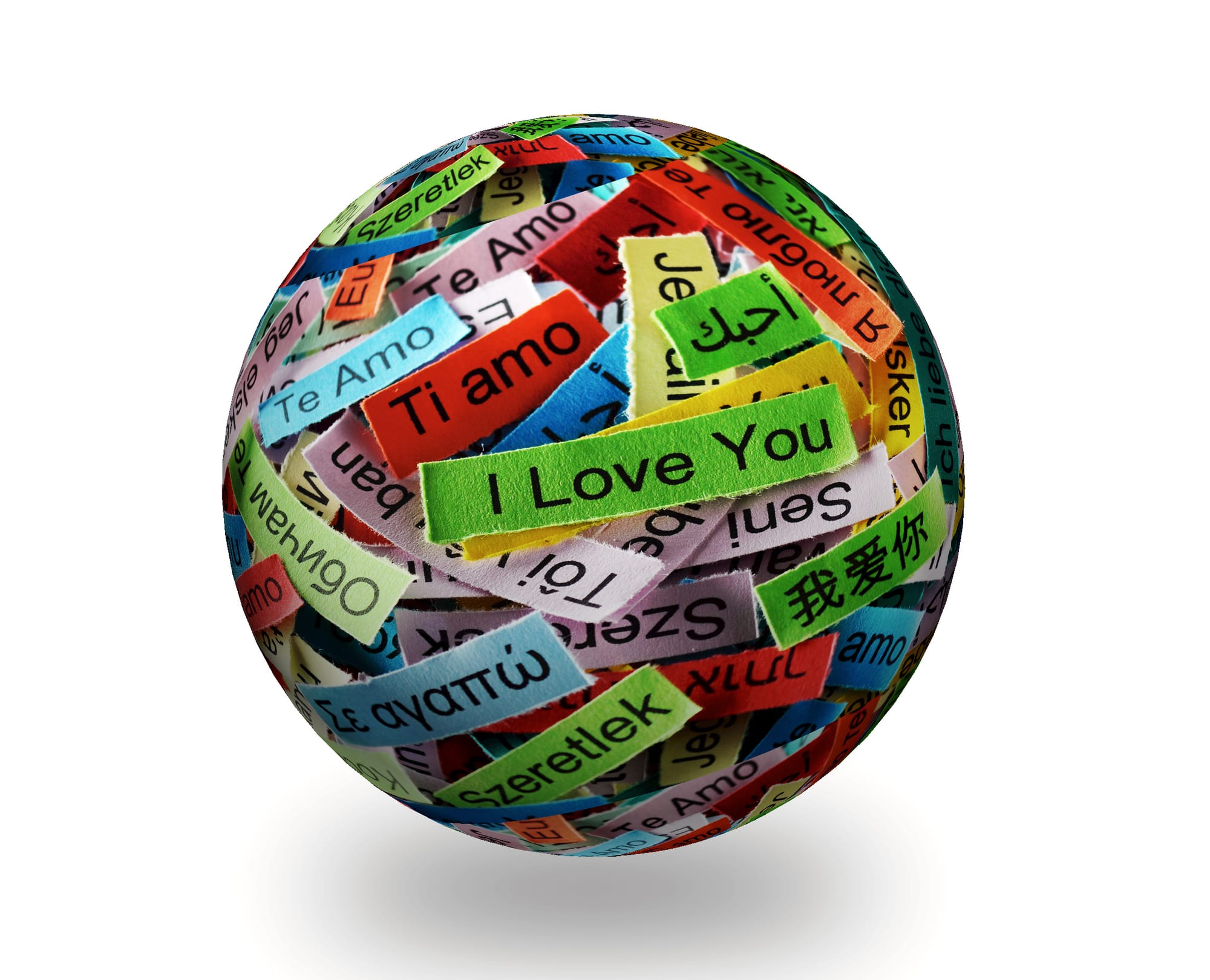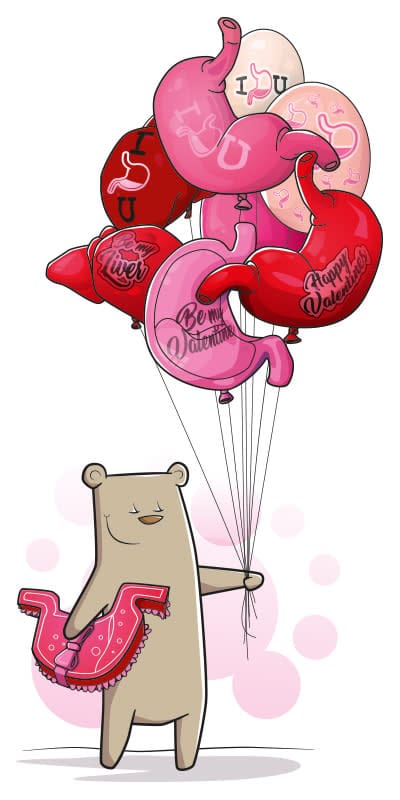
The origin of Valentine’s Day is steeped in legend and myth but we know that by the end of the 18th century, British lovers and potential lovers were exchanging small gifts and cards, and soon these cards became the eponymous valentines.
For some time, Valentine’s Day was celebrated in Britain not unlike Halloween is celebrated in the USA. Children would go door-to-door begging (or valentining, as the noun had evolved into a verb) for treats and for their effort were often given sweet Valentine Buns.
The language of ‘love’
But these days Valentine’s Day is all about love, which is an interesting word unto itself.
Love can be traced to the earliest days of English, to the Old English word lufu, and with the original meaning of ‘affection, attachment and fondness’. It is related to the German Liebe and Dutch liefde.
English speakers have toyed at various points in history with replacing love with its romantic Latin-French equivalents (e.g. French amour). French or Latin words often killed off Old English words in the realm of romance and body parts with the arrival of the Normans (e.g. the French-origin face beat out the Old English neb). However, when it comes to amour-related words, we might say love conquered all (except perhaps the amorous).
In the 13th century, we called our lovers leman, from a blend of leof ‘beloved’ and ‘man’, but this word quickly took a negative turn (as words associated with sex often do). Leman became associated with lovers in affairs from the early 14th century, and specifically became associated with mistresses not long after.
By the 15th century, we were falling in love and addressing our lovers as love and by the 16th century we were making love (but not yet in the sense that you’re likely thinking!). The phrase 'make love' was borrowed into English from the French faire l’amour and/or the Italian far l’amore. Howev

er, 'make love' in this sense first meant ‘to court or pay amorous attention to’. The popular ‘engage in sexual intercourse’ meaning of 'make love' emerged in the USA and not until the 20th century.
I love you from the bottom of my liver: Love across cultures
We love from our hearts in the English-speaking world but this certainly isn’t the case across all cultures.
The Berbers love with their livers rather than their hearts, and so do people in the Malay and Indonesian-speaking world. In Persian (or Farsi as it is also known), the seat of emotions is the stomach, and in Iran when your lover goes away your ‘stomach gets tight or narrow’.
The equivalent word for love in other languages doesn’t always convey the same emotion English speakers associate with it.
The Ifaluk people of Micronesia have a word fago that rather than referring to love specifically, more broadly refers simultaneously to a sense of ‘love/sadness/compassion’.
The Nyinba language of Nepal reputedly sees sexual relationships valued positively for the interpersonal connection they foster through dödchag ‘carnal desire’, but there is no other word to represent romantic love between partners.
Tarzan and ice cream: Looks and longings across cultures
We have a range of tastes in our partners and these are often reflected in the language we use to describe them.
Adam Jacot de Boinod points out in Bengali there is a word rombhoru, which means ‘a woman having thighs as well-shaped as banana trees’. In the Oshindonga language of Namibia, a woman who is e thamba, is ‘big, fat and clean’.
It is worth noting such words highlight a trend in many languages, English included, that there tend to be more words describing the appearance of women than men, and many of these words are often less than kind and prone to deterioration (like leman above).
For instance, whore was once a term of endearment for either sex, along the lines of ‘dear’ or ‘my love’, but soon exclusively came to be used with women and deteriorated to its current meaning. Slut once meant an ‘untidy woman’ and Chaucer is noted using it to describe sluttish ‘untidy’ men, but, of course, its modern meaning is limited to women and quite different.
That all said, there are words to describe the appearance of men in many cultures (though these are often more positive than those words describing women). The author de Boinod points out in Hebrew there is a word tarzan ‘a dandy’, in Italian bellone ‘a hunk who is a bit too pleased with himself’ and in French armoire à glace, literally ‘a wardrobe of ice cream’, but meaning ‘a great brute’.
Let’s get physical: Having a ‘naughty’ the Aussie way
At the risk of sounding crass, Australian English has some beaut words for what we do between the sheets.
We’ve been having a naughty in Australia since the 1950s (well, we’ve been having them longer than that, but calling them that since at least 1959). We’ve been able to naughty someone as a verb since the 1970s.
The word pash as a shortening of passion has been around in Britain since the late 19th century but the ‘passionate kiss’ meaning emerged in Australia in the 1960s as did the pash session for ‘heavy passionate kissing or petting’. Pash rash, that ‘irritation from kissing someone with a beard’, arrived on the scene in the early 2000s according the Australian National Dictionary (AND).
Root as a noun and verb for ‘sex’ emerged in Australia in the 1950s but as with pash it might be traced to an earlier, British word (root was a British slang word for penis in the late 19th century). By the 1960s, some Australians were calling their sexual partners ‘roots. By the 1990s the AND notes the appearance of the root ute ‘a vehicle furnished with a mattress for having sex’.
How does one avoid getting pregnant in Australia? Well, what we call coitus interruptus varies depending on where one lives in Australia. For instance, if you live in Sydney you may get off at Redfern (one station before Sydney Central) and if you live in Melbourne you’d likely take a ticket to Coburg but get off at Brunswick.
Happy Valentine’s Day
So how do you celebrate Valentine’s Day? Many years ago you might have sent a copy of Pamphilus, seu de amore, which was a 12th century erotic poem (in fact one of the best known poems of its era). However, the size of the paper on which this poem was printed led to its evolution into the modern word pamphlet. I’d skip the pamphlet and perhaps stick to giving your lover a valentine’s card or just saying ‘I love you’. That is, unless you want to sleep in the ute alone.





